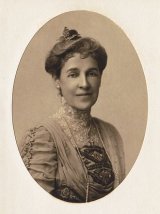Place de la Concorde
Florence Earle Coates 1850 (Philadelphia) – 1927 (Philadelphia)
Near where the royal victims fell
In days gone by, caught in the swell
Of a ruthless tide
Of human passion, deep and wide:
There where we two
A Nation’s later sorrow knew—
To-day, O friend! I stood
Amid a self-ruled multitude
That by nor sound nor word
Betrayed how mightily its heart was stirred.
A memory Time never could efface—
A memory of Grief—
Like a great Silence brooded o’er the place;
And men breathed hard, as seeking for relief
From an emotion strong
That would not cry, though held in check too long.
One felt that joy drew near—
A joy intense that seemed itself to fear—
Brightening in eyes that had been dull,
As all with feeling gazed
Upon the Strasburg figure, raised
Above us—mourning, beautiful!
Then one stood at the statue’s base, and spoke—
Men needed not to ask what word;
Each in his breast the message heard,
Writ for him by Despair,
That evermore in moving phrase
Breathes from the Invalides and Père Lachaise—
Vainly it seemed, alas!
But now, France looking on the image there,
Hope gave her back the lost Alsace.
A deeper hush fell on the crowd:
A sound—the lightest—seemed too loud
(Would, friend, you had been there!)
As to that form the speaker rose,
Took from her, fold on fold,
The mournful crape, gray-worn and old,
Her, proudly, to disclose,
And with the touch of tender care
That fond emotion speaks,
’Mid tears that none could quite command,
Placed the Tricolor in her hand,
And kissed her on both cheeks!
Font size:
Submitted by naama on July 13, 2020
Modified on March 05, 2023
- 1:18 min read
- 8 Views
Quick analysis:
| Scheme | AABBCCXXDD EFEFGG HHIJJI XDDKXEXKX LLKMNNMKOPPO |
|---|---|
| Closest metre | Iambic tetrameter |
| Characters | 1,430 |
| Words | 260 |
| Stanzas | 5 |
| Stanza Lengths | 10, 6, 6, 9, 12 |
Translation
Find a translation for this poem in other languages:
Select another language:
- - Select -
- 简体中文 (Chinese - Simplified)
- 繁體中文 (Chinese - Traditional)
- Español (Spanish)
- Esperanto (Esperanto)
- 日本語 (Japanese)
- Português (Portuguese)
- Deutsch (German)
- العربية (Arabic)
- Français (French)
- Русский (Russian)
- ಕನ್ನಡ (Kannada)
- 한국어 (Korean)
- עברית (Hebrew)
- Gaeilge (Irish)
- Українська (Ukrainian)
- اردو (Urdu)
- Magyar (Hungarian)
- मानक हिन्दी (Hindi)
- Indonesia (Indonesian)
- Italiano (Italian)
- தமிழ் (Tamil)
- Türkçe (Turkish)
- తెలుగు (Telugu)
- ภาษาไทย (Thai)
- Tiếng Việt (Vietnamese)
- Čeština (Czech)
- Polski (Polish)
- Bahasa Indonesia (Indonesian)
- Românește (Romanian)
- Nederlands (Dutch)
- Ελληνικά (Greek)
- Latinum (Latin)
- Svenska (Swedish)
- Dansk (Danish)
- Suomi (Finnish)
- فارسی (Persian)
- ייִדיש (Yiddish)
- հայերեն (Armenian)
- Norsk (Norwegian)
- English (English)
Citation
Use the citation below to add this poem to your bibliography:
Style:MLAChicagoAPA
"Place de la Concorde" Poetry.com. STANDS4 LLC, 2024. Web. 20 Apr. 2024. <https://www.poetry.com/poem/54032/place-de-la-concorde>.



Discuss the poem Place de la Concorde with the community...
Report Comment
We're doing our best to make sure our content is useful, accurate and safe.
If by any chance you spot an inappropriate comment while navigating through our website please use this form to let us know, and we'll take care of it shortly.
Attachment
You need to be logged in to favorite.
Log In